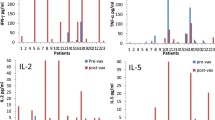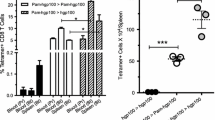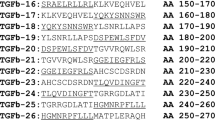Abstract
Purpose: Most melanoma cell lines express HLA class II antigens constitutively or can be induced to do so with interferon γ (IFNγ). We have previously demonstrated that peptide-specific CD4+ T cells proliferate in response to HLA-class-II-antigen-mediated peptide presentation by melanoma cells in vitro and produce interleukin-10 (IL-10) and (IFNγ). We asked whether the responding T cells kill the tumor cells and, if so, whether direct cell contact was required. Methods: Two HLA class II+ melanoma cell lines derived from metastases were co-cultured with a human CD4+ T cell clone specific for influenza hemagglutinin peptide (HA). T cells, melanoma, and HA were co-cultured for 48 h. Melanoma cells with and without HA and/or T cells served as controls. After 36 h, the medium was removed for cytokine analysis by enzyme-linked immunosorbent assay (ELISA). Twelve hours later non-adherent cells were washed away and the adherent melanoma cells were trypsinized and counted. Dual-chamber culture plates were used to determine whether cell contact and/or exposure to cytokine were required for tumor cell death. Results: Melanoma cell counts were over 80% lower in wells containing T cells than in wells with melanoma and peptide alone (P < 0.05). ELISA of supernatants revealed production of IFNγ and IL-10 by the responding T cells. Direct T cell contact with tumor cells was not required for tumor cell death, as melanoma cells were killed when they shared medium but had no contact with T cells responding to peptide presentation by HLA-class-II-antigen-positive melanoma cells in a separate chamber. Blocking antibody to IFNγ but not IL-10 prevented melanoma cell death at levels of cytokine similar to that present in co-culture assays. Conclusions: Peptide-specific CD4+ T cells kill melanoma cells in vitro when they recognize peptide presented by the tumor cell in the context of HLA class II antigen. Direct cell contact is not required, suggesting that it is a cytokine-mediated event. Immunotherapy, using primed CD4+ T cells and peptide, may be beneficial in patients whose tumors express HLA class II antigens or can be induced to do so with IFNγ.
Similar content being viewed by others
Author information
Authors and Affiliations
Additional information
Received: 1 July 1999 / Accepted: 17 September 1999
Rights and permissions
About this article
Cite this article
Brady, M., Lee, F., Petrie, H. et al. CD4+ T cells kill HLA-class-II-antigen-positive melanoma cells presenting peptide in vitro. Cancer Immunol Immunother 48, 621–626 (2000). https://doi.org/10.1007/s002620050010
Issue Date:
DOI: https://doi.org/10.1007/s002620050010




